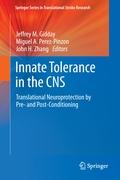- Start
- Innate Tolerance in the CNS
Innate Tolerance in the CNS
Angebote / Angebote:
Cerebral ischemia from cardiac arrest, stroke, and subarachnoid and intracerebral hemorrhage, together with trauma, epilepsy, and other CNS pathologies, continue to impose immense burdens of morbidity and mortality the world over. Despite many decades of research aimed at understanding the genetic and molecular basis of these pathologies, therapeutics developed on the basis of blocking ‘known’ injury mechanisms can actually claim few clinical successes. The field of CNS “preconditioning” was born from the preclinical finding more than 20 years ago that intentional activation of innate, cytoprotective factors could provide robust protection, or “tolerance” against cerebral ischemic injury. Herein, up-to-date summaries on all aspects of preconditioning for CNS disease, including the emerging topics of postconditioning and remote pre- and post-conditioning, are provided by the leading scientists in the field. The translational potential of both preclinical and clinical advances is underscored throughout, with the hope of accelerating the bench-to-bedside success of endogenous cytoprotection as a therapeutic strategy. Jeffrey M. Gidday PhD, Associate Professor of Neurosurgery at Washington University School of Medicine, has been working in the field of CNS preconditioning for 18 years, and has numerous publications on preconditioning-induced protection in the setting of several different cerebral and retinal pathologies. Miguel A. Perez-Pinzon PhD is Professor of Neurology/Neuroscience, Vice-Chair for Basic Science of Neurology at the University of Miami Miller School of Medicine. He began studies of ischemic preconditioning in 1995 and for many years prior to that worked in the field of anoxia tolerance, publishing close to 50 peer-reviewed articles and many book chapters on these topics. John H. Zhang MD PhD is Professor of Neurosurgery, Anesthesiology, and Physiology, and Vice-Chair of the Basic Science Department at the Loma Linda University School of Medicine. His research interests include stroke and medical gases, and he has published papers related to pre-, post- and remote-conditioning in subarachnoid hemorrhage, focal cerebral ischemia, and neonatal brain injury.
Lieferbar in ca. 20-45 Arbeitstagen
